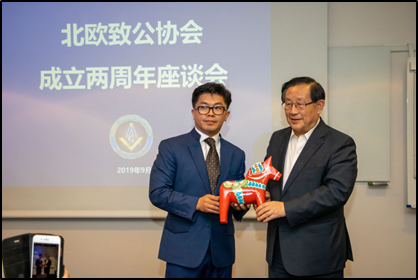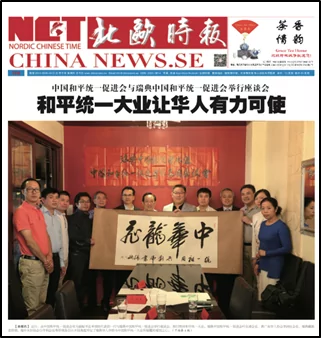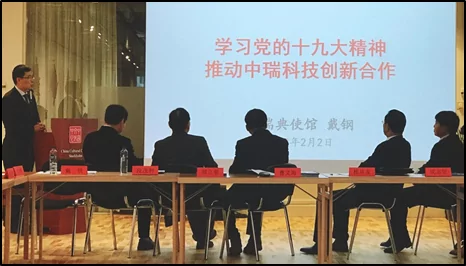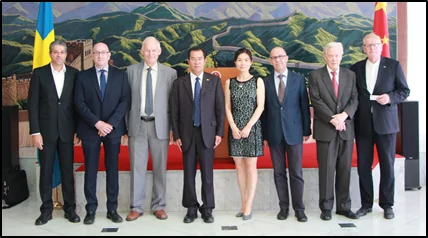
The CCP’s United Front Network in Sweden
Publication: China Brief Volume: 20 Issue: 16
By:

Introduction
Throughout the last few years, Sweden’s relationship with the People’s Republic of China (PRC) has grown more tense. With increasing concerns about trade and technology mirroring discussions in other Western countries, the Swedish-Chinese relationship has been further strained as a result of Beijing’s kidnapping and subsequent refusal to release the Swedish citizen Gui Minhai (桂民海) (China Brief, April 1). The PRC party-state has struggled to find support from other segments of Swedish society: according to a Pew poll last year, Swedes had the second most unfavorable views about China among 34 surveyed countries, trailing only Japan (Pew Research Center, December 5, 2019). This presents a challenge for united front work—albeit one ameliorated so far by the general lack of awareness in Sweden of how the Chinese Communist Party (CCP) operates at home and abroad.
Gui Congyou (桂从友), the PRC Ambassador to Stockholm, has gained notoriety as a forceful defender of PRC policies, often by using threatening language. Despite coverage by domestic and international media of Ambassador Gui’s ”wolf warrior” diplomacy—as well as coverage of the downturn in Swedish-Chinese relations more broadly—the CCP’s active united front work in Sweden has, until recently, avoided public attention. Similar to the functioning of the united front system elsewhere (Australian Strategic Policy Institute, 2020), united front work in Sweden is to a large extent focused on what Ambassador Gui frequently calls establishing “harmonious diaspora associations” (和谐侨社, hexie qiaoshe) (Bei-Ou Zhonghua Wang, June 5, 2018; PRC Embassy in Sweden, December 30, 2018; September 4, 2019).
This concept dates back to the Hu Jintao – Wen Jiabao era, when the then-head of the Overseas Chinese Affairs Office Li Haifeng (李海峰) explained that it was necessary to promote “harmonious diaspora associations,” due to the fact that the proliferation of overseas Chinese associations had led to “complications” and insufficient “unity” (PRC Government, June 21, 2007). In Sweden a wide variety of groups are affiliated with the united front system in some way or another, including:
- Hometown associations (同乡会, tongxiang hui);
- The Stockholm Overseas Chinese Service Center (斯德哥尔摩华助中心, Sidege’ermo Hua Zhu Zhongxin), which was founded in 2017 with authorization from the Overseas Chinese Affairs Office, a united front organ (PRC Embassy in Sweden, October 20, 2017);
- Local branches of the Chinese Students and Scholars Association;
- Professional organizations, media outlets and other networks.
The Reunification Council and Its “Backbone Strength”
The Swedish China Council for the Promotion of Peaceful National Reunification (瑞典中国和平统一促进会, Ruidian Zhongguo Heping Tongyi Cujinhui), which was founded in 2005, serves as a central node in the Swedish united front community (PRC Embassy in Sweden, February 1, 2005). The Reunification Council is a local offshoot of the CCP United Front Work Department’s umbrella organization of the same name, which maintains chapters around the world and seeks to support both PRC annexation of Taiwan as well as other CCP policy ambitions (China Brief, February 13, 2018; China Brief, May 9, 2019).
Like its parent organization, the Swedish subsidiary is engaged in pro-CCP activism. While receiving a delegation from the PRC National People’s Congress Ethnic Affairs Committee, Zong Jinbo (宗金波), one of the Reunification Council’s honorary chairmen, bragged that his organization had mobilized protests during contentious episodes for the Chinese government: for example, in 2012 during heated tensions with Japan over the Senkaku/Diaoyu Islands, and in 2016 when the Hague Tribunal denied China’s claims in the South China Sea (Swedish Chinese National Association, May 27, 2019). In 2019, the Reunification Council also co-signed a public letter that condemned Svenska nyheter, a satirical news program on Swedish public television, for allegedly insulting the Chinese people and “maliciously chang[ing] Chinese territory [by showing a map that left out Taiwan] and ridicul[ing] the national flag” (Greenpost.se, October 5, 2018). [1]
The individuals leading the Reunification Council command a broad network of other associations in the diaspora community. The Reunification Council’s chairman Ye Pei-quan (叶沛群) is also chairman of a Chinese language school in Stockholm, committee chairman of the Nordic Zhigong Association (see below), and chairman of the Swedish Chinese National Association (瑞典华人总会, Ruidian Huaren Zonghui). The above-mentioned Zong Jinbo, a PLA veteran (Bei-Ou Huaren Wang, August 1, 2016), leads the Swedish Tianjin Association (PRC Embassy in Sweden, February 17, 2018). Li Runsheng (李润生), another former honorary chairman, leads the Sweden Cantonese Chinese Association (Sweden Cantonese Association, no date). Ye Kexiong (叶克雄), Ye Pei-quan’s uncle, is in charge of the Qingtian Association of Sweden (Qingtian Association, no date), whose name refers to a Zhejiang county that is the ancestral home for a large portion of Sweden’s Chinese diaspora.
Ye Pei-quan has emphasized that “Chinese associations in Sweden must be united and avoid that some associations affect this unity [negatively] to promote their own interests.” [2] Ye’s own overlapping positions seem to mirror this spirit of “unity.” The nominally apolitical Swedish Chinese National Association (SCNA) has grown close to the Reunification Council, and Ambassador Gui himself has described the SCNA as the “backbone strength” (骨干力量, gugan liliang) of the Reunification Council (PRC Embassy in Sweden, December 16, 2019). Despite these connections, the SCNA received 812,000 Swedish kronor (approximately $93,000 U.S. dollars) in public grants from 2012 to 2017 (MUCF, no date).

Party-Building by Another Name: the Nordic Zhigong Association
In September 2015 the SCNA hosted a visit from the Shanghai branch of the China Zhi Gong Party (中国致公党, Zhongguo Zhigong Dang), one of China’s eight so-called “democratic parties” that participate in the Chinese People’s Political Consultative Conference and join forces with the CCP as “friendship parties” (CCP United Front Work Trial Regulations, September 23, 2015). One of the participants in this event was a man named Zhou Bin (周斌), a Zhi Gong Party member who two years prior had moved to Sweden. Still keen to ”protect the organization’s interests,” Zhou suggested that the party should set up an organization in Sweden, a suggestion that reportedly was met with approval (Shanghai People’s Political Consultative Conference, September 24, 2015).
A year and a half later, in March 2017, The Nordic Zhigong Association (北欧致公协会, Bei-Ou Zhigong Xiehui) was formally announced in Stockholm; the launch event included representatives from the five Nordic countries, attendees from Air China and ZTE’s offices in Stockholm, academics, and united front figures (Nordic Zhigong Association, March 27, 2017). Although it shares a similar name with the Zhi Gong Party in China, the Stockholm-based organization claims to be an independent organization. Despite this, it maintains an identical slogan—”devote oneself to the public good, overseas Chinese dedicated to serving the country” (致力为公, 侨海报国, zhi li wei gong, qiaohai baoguo)—and has expressed intent to utilize its deep connections with the Chinese party (Youtube, April 8, 2017).
The China Zhi Gong Party’s primary characteristic is that it mobilizes overseas and returned Chinese persons on behalf of the Chinese state. Under the leadership of its current chairman Wan Gang (万钢), who served as PRC Minister for Science and Technology in 2007–2008, the party has become increasingly focused on strengthening China’s scientific base through foreign connections. Like its unofficial parent organization, the Nordic Zhigong Association (NZA) is also oriented towards the technology and business communities. The association is led by Cao Yihai (曹义海), a professor at the renowned Karolinska Institute, who stated at the time of the organization’s founding that their members are “characterized by being highly educated and high quality” (Nordic Zhigong Association, March 27, 2017).
Two years after the NZA’s founding it claimed to have “more than 60 members, out of which more than 60 percent have PhDs” (Nordic Zhigong Association, September 10, 2019). In the words of Ye Pei-quan, who is the association’s Director General, “numerous science and technology talents are members of the [NZA]. They come from universities and research institutes across the Nordic region and are in charge of various scientific research programs. The [NZA] wants to build a bridge for science and technology between the Nordics and China, to introduce the results and research programs to the Fatherland” (Nordic Zhigong Association, July 13, 2018).
Despite being evasive about its affiliation with the China Zhi Gong Party, the NZA has not shied away from expressing loyalty to the CCP. Following the conclusion of the CCP’s 19th Congress in 2017, the association lauded the congress’s success and declared that “all members of the [NZA]… firmly believe in the realization of the Chinese nation under the leadership of General Secretary Xi” (Nordic Zhigong Association, October 19, 2017). Subsequently, in early 2018 the association participated in an embassy-organized seminar under the banner of “Studying the Spirit of the Party’s 19th Congress, Promoting Sino-Swedish Cooperation in Science and Technology Innovation” (Nordic Zhigong Association, February 3, 2018).

The Curious Case of the “Belt and Road Institute in Sweden”
Beyond the harmonious diaspora associations, there is one organization—despite its otherwise notorious status in Sweden—that Ambassador Gui can credibly refer to as his “Swedish friends” (PRC Embassy in Sweden, July 28, 2019). This is the Belt and Road Institute in Sweden (referred to in Chinese as 瑞典”一带一路”执行小组 / Ruidian “Yidai Yilu” Zhixing Xiaozu, meaning “the Belt and Road Initiative Executive Small Group”), or BRIX. BRIX is composed of individuals who, on the face of it, make for strange bedfellows with the CCP: its founding members primarily come from the Swedish branch of the Germany-based Schiller Institute, a front organization of the so-called LaRouche Movement. [3]
BRIX’s purpose is to promote Sweden’s accession to the Belt and Road Initiative (BRI), and to provide what it considers accurate information about the BRI (BRIX, December 17, 2018). The Chinese embassy in Stockholm has developed close ties to BRIX and has financed at least one of their conferences (Sveriges Radio, August 17, 2019). Ambassador Gui has participated in multiple BRIX seminars (PRC Embassy in Sweden, May 22, 2019; December 5, 2019; April 29; June 11). Ulf Sandmark, chairman of both BRIX and the Swedish section of the Schiller Institute, has been invited as an economic ”scholar” to talk about the BRI at a seminar arranged by the Nordic Chinese Times (Bei-Ou Huaren Wang, November 28, 2019).

So far BRIX does not seem to have attracted much support. While the institute reports high attendance by foreign diplomats at its events (BRIX, undated), media scrutiny of the institute has given rise to criticism. In August 2019 Swedish public radio raised public awareness of the institute and revealed that one of its leaders, Lydia Liu (刘芳), had extensive connections with United Front Work Department officials (Sveriges Radio, August 17, 2019). Liu, who is also chairman of the Swedish Hubei and Hunan Association (瑞典两湖同乡会, Ruidian Liang Hu Tongxianghui) and a council member of the Stockholm-adjacent Nacka Municipality, was expelled from the Christian Democrats party shortly after the revelations (Sveriges Television, November 9, 2019).
Swedish China observers have generally been baffled that embassy officials have chosen to associate themselves with the Schiller Institute—something widely seen as self-sabotage, given the organization’s bad reputation. However, Schiller Institute-affiliated individuals in Sweden have proven themselves overtly willing to go along with the CCP’s ambition to “make foreigners serve China” (洋为中用, yang wei zhong yong) [4].
A Daunting Theater for the Great United Front
With a high level of popular distrust of the PRC government in Sweden, united front actors have so far struggled to make a mark on mainstream society in the Nordic country. The embassy’s choice to cooperate with BRIX—which signals its lack of more well-established partners—has sparked ridicule rather than mobilizing support for PRC policies. Meanwhile, organizations directed toward the Chinese diaspora in Sweden have successfully been “harmonized” by pro-CCP individuals and organizations, something that until recently took place without attracting attention from the public. Given that united front actors operated without any scrutiny for so long, it would be wise to assume that much of their work has still not been revealed.
Pär Nyrén is a fellow at the Stockholm Free World Forum and non-resident fellow at Sinopsis. This article has been produced as a part of a research project for Sinopsis and is based on a Swedish-language paper published by the Stockholm Free World Forum.
Notes
[1] The Green Post is run singlehandedly by Xuefei Chen Axelsson (陈雪霏), a former Stockholm correspondent for People’s Daily Online (Greenpost, undated; People’s Daily, May 10, 2010), and has previously had an article-sharing agreement with China News Service (Bei-ou Zhonghua Wang, April 26, 2019).
[2] Nordic Chinese Times operates under the “guidance” (指导, zhidao) of China News Service and cooperates with the People’s Daily overseas edition (Nordic Chinese Times, undated).
[3] The LaRouche Movement, named after its founder Lyndon LaRouche, is a political network that traces its origins to the United States in the 1970s. It started out as a far left, Soviet-supporting organization that has consistently been a vehicle for spreading conspiracy theories and has been described by former members as sectarian. The movement has at times been surveilled by the Swedish Secret Service, primarily during the 1970s (Government of Sweden, February 1, 2002). Currently the movement, which nowadays has a meagre following, is animated by questioning climate change and supporting China’s Belt and Road Initiative.
[4] Anne-Marie Brady, Making the Foreign Serve China: Managing Foreigners in the People’s Republic (Rowman & Littlefield, 2003).




